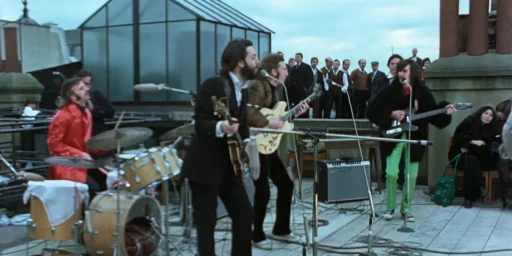Fleetwood Mac
Douglas Wolk pulls an interesting bait and switch with his Slate piece, “Going Their Own Way – Why is Fleetwood Mac the least influential great band ever?” The title and lede give the impression he was going to tell us what a lousy band they were. Far from it:
Has there ever been a less-influential great band than Fleetwood Mac? The three albums they’ve just reissued in expanded form made them international stars in the 1970s and 1980s. Rumours (Warner Bros., 1977) is one of the best-selling records ever, recently certified at 19 million copies and counting in the United States; Fleetwood Mac (Reprise, 1975) and Tusk (Warner Bros., 1979) went multiplatinum, too. “Landslide,” “Never Going Back Again,” and “Dreams” have been radio staples for decades. And yet almost nobody has tried ripping off Fleetwood Mac’s basic sound and style—even unsuccessfully. Dozens of hit records have been derived from Led Zeppelin and Shania Twain and Michael Jackson; the only Fleetwood Mac pastiche that comes to mind is the Magnetic Fields’ 1999 joke “No One Will Ever Love You.” Bonnie Tyler and Courtney Love have tried to evoke the white-winged-dove essence of singer Stevie Nicks—but Stevie Nicks is not the same thing as Fleetwood Mac.
And that’s part of the problem in trying to imitate them. In the late-’70s period documented by these reissues, the band had three front-people—Nicks, Lindsey Buckingham, and Christine McVie—who individually wrote and sang major hits, an almost impossible feat. (The only other group to have done anything like this in the past 20 years was the Traveling Wilburys—more an all-star joke than a real group.)
What really made these three albums tick, though—and made their sound basically irreproducible—was that late-’70s Fleetwood Mac was an improbable balancing act, powered by internal conflicts and bizarre chemistry. I don’t mean the infamous intraband heartbreak (Christine and bassist John McVie, Nicks and Buckingham, and drummer Mick Fleetwood and his wife all split up before Rumours) or their massive drug intake, but their griffin-like hybrid of pop traditions. A California-to-the-core studio obsessive with a permanent case of the jitters (Buckingham), a dreamy mystical type with a gift for ornate, languorous melodies (Nicks), and a veteran British rhythm section with roots in raw electric blues (Fleetwood and the McVies): Try faking that combination.
That particular iteration of the group peaked while I was in junior high school. They did have a remarkable string of hits–both together and to a lesser degree as solo artists–during a fairly short period. It’s amazing how many of those songs are still oldies radio standards. Sadly, though, they’re likely most remembered as the theme music for the Clinton campaigns.






In ’77 I was newspaper editor in college, I wrote an album review I titled “God Save Fleetwood Mac”.
It was for the Sex Pistols’ debut album, Never Mind The Bullocks.
The shame of this is that the best record they ever made was Mirage in the early 80s. I don’t recall too many his from it (“Gypsy” and “Hold Me” were it, I believe). But there were some incredibly well-crafted songs on that LP that didn’t fit easily into the pop pastiche the writer discusses. Unfortunately, the Clinton connection renders most of their work unlistenable to me now. Didn’t one of the Nine Losers use a FM song at one point?
You should listen to some of the blues stuff (early to mid 70’s) that they did in the UK before they came to the US and picked up Stevie and Lindsey.